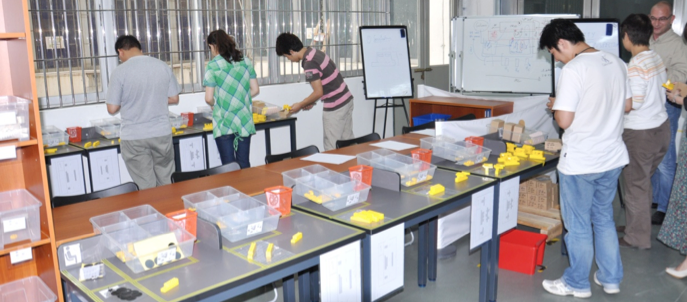 I recently had the opportunity to work with Hubert Delelis Fanien, founder of Aka Outspring. He has set up a training center for QC inspectors in Shenzhen, China. He also helps local companies hire and evaluate their inspectors.
I recently had the opportunity to work with Hubert Delelis Fanien, founder of Aka Outspring. He has set up a training center for QC inspectors in Shenzhen, China. He also helps local companies hire and evaluate their inspectors.
I was impressed by his unique teaching approach and by his experience in managing Chinese staff. He was kind enough to respond to my questions.
Q: Can you tell us a little about your background and how you developed the methods you use to teach QC inspectors?
In my 16 years working for a major French multinational — including 12 years as a Business Unit Manager in China — I have recruited and trained hundreds of Chinese team members.
My mission was to ensure customer satisfaction through Quality. I had to adjust my training and coaching method in order to become more effective. I had to adjust the way of delivering the competency, rather than the content itself (which is exclusively concrete, with a strong focus on the “sense”). My teaching method has been validated in the field, through trial and error (doing and then measuring results).
I used this experience to set up an exclusive and unique Operational Training Center [see below photo].
Q: What service would you offer to a sourcing office with, say, 5 inspectors on the ground and no in-house training/auditing system?
The aim of my company is to transmit competency: to make people and their organization autonomous. So my offer would be :
- Train the team and provide the coaching tools,
- Identify the person capable of being an instructor,
- Coach the future instructor to create and implement the training on his team.
Our objective is autonomy by creating a learning cycle.
Q: What are the most widespread mistakes committed by inspectors in their job?
I have observed 3 major mistakes and/or difficulties that impact systematically reliability and efficiency of the inspection:
- The way to pick cartons for inspection (randomness does not mean there is no procedure to follow),
- The variance between 2 inspectors in judging the same non conformity,
- Missing or forgetting control points (non-respect or non-existence of the sequence in the inspection process).
Q: I noticed that you spend some time explaining to the trainees what a foreign buyer expects. What are the most frequent causes of misunderstanding?
Probably the most frequent cause of misunderstanding is the difference of value of a “YES” for a Westerner and for a Chinese.
As a Westerner, there is only one value, only one level. From a Chinese perspective, I used to say there are 3 levels: “yes, I hear you”, “yes, I understand you” and “yes, I will do”. You’d better know which one you are getting when your Chinese supplier replies “yes” to you!
Q: You also search and evaluate candidates for the position of quality manager. What traits and skills do you look for?
I always focus on personalities, because competency can be learned while personalities don’t change.
Each position and company will require specific traits. It is important to know and observe how the company and its employees work, in order to identify which traits will increase the chances of integration and future success inside this company.
For the position of Quality Manager, the candidates with the most suitable personalities will demonstrate :
- An active attitude (a passion in acting, doing, using his hands),
- A masculin dominant character (a desire to do well, strong convictions, and a willingness to go ahead),
- A rational intelligence (capacity to extract patterns and to identify links between situations).
All those attitudes will make it easier for the candidate to identify non conformities and variances, to convince their co-workers, to obtain concrete action plans, and to lead permanent progress.
—–
If you have questions, you can contact Hubert by email at: h.delelis [at] akaoutspring.com.

